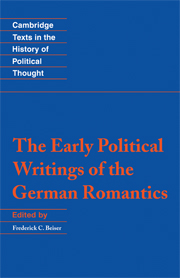Book contents
- Frontmatter
- Contents
- Preface
- Introduction
- Chronology of early Romanticism
- Bibliographical note
- Translations
- Editions cited and abbreviations
- The Oldest Systematic Programme of German Idealism
- Pollen
- Faith and Love
- Political Aphorisms
- Christianity or Europe: A Fragment
- Fragments from the notebooks
- Essay on the Concept of Republicanism occasioned by the Kantian tract ‘Perpetual Peace’
- Athenœum Fragments (excerpts)
- Ideas
- Philosophical Lectures: Transcendental Philosophy (excerpts), Jena, 1800–1801
- Philosophical Fragments from the Philosophical Apprenticeship (excerpts)
- Monologues II and III
- Index of names
- Index of subjects
- Cambridge Texts in the History of Political Thought
Christianity or Europe: A Fragment
Published online by Cambridge University Press: 05 June 2012
- Frontmatter
- Contents
- Preface
- Introduction
- Chronology of early Romanticism
- Bibliographical note
- Translations
- Editions cited and abbreviations
- The Oldest Systematic Programme of German Idealism
- Pollen
- Faith and Love
- Political Aphorisms
- Christianity or Europe: A Fragment
- Fragments from the notebooks
- Essay on the Concept of Republicanism occasioned by the Kantian tract ‘Perpetual Peace’
- Athenœum Fragments (excerpts)
- Ideas
- Philosophical Lectures: Transcendental Philosophy (excerpts), Jena, 1800–1801
- Philosophical Fragments from the Philosophical Apprenticeship (excerpts)
- Monologues II and III
- Index of names
- Index of subjects
- Cambridge Texts in the History of Political Thought
Summary
Those were beautiful, magnificent times, when Europe was a Christian land, when one Christianity dwelled on this civilized continent, and when one common interest joined the most distant provinces of this vast spiritual empire. Without great worldly possessions one sovereign governed and unified the great political forces. Immediately under him stood one enormous guild, open to all, executing his every wish and zealously striving to consolidate his beneficent power. Every member of this society was honoured everywhere. If the common people sought from their clergyman comfort or help, protection or advice, gladly caring for his various needs in return, he also gained protection, respect and audience from his superiors. Everyone saw these elect men, armed with miraculous powers, as the children of heaven, whose mere presence and affection dispensed all kinds of blessings. Childlike faith bound the people to their teachings. How happily everyone could complete their earthly labours, since these holy men had safeguarded them a future life, forgave every sin, explained and erased every blackspot in this life. They were the experienced pilots on the great uncharted seas, in whose shelter one could scorn all storms, and whom one could trust to reach and land safely on the shores of the real paternal world. The wildest and most voracious appetites had to yield with honour and obedience to their words. Peace emanated from them.
They preached nothing but love for the holy, beautiful lady of Christianity who, endowed with divine power, was ready to rescue every believer from the most terrible dangers.
- Type
- Chapter
- Information
- The Early Political Writings of the German Romantics , pp. 59 - 80Publisher: Cambridge University PressPrint publication year: 1996
- 5
- Cited by



